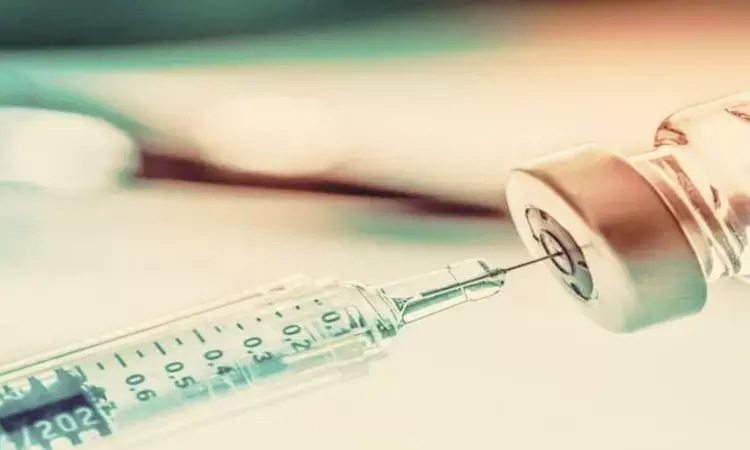- Home
- Medical news & Guidelines
- Anesthesiology
- Cardiology and CTVS
- Critical Care
- Dentistry
- Dermatology
- Diabetes and Endocrinology
- ENT
- Gastroenterology
- Medicine
- Nephrology
- Neurology
- Obstretics-Gynaecology
- Oncology
- Ophthalmology
- Orthopaedics
- Pediatrics-Neonatology
- Psychiatry
- Pulmonology
- Radiology
- Surgery
- Urology
- Laboratory Medicine
- Diet
- Nursing
- Paramedical
- Physiotherapy
- Health news
- Fact Check
- Bone Health Fact Check
- Brain Health Fact Check
- Cancer Related Fact Check
- Child Care Fact Check
- Dental and oral health fact check
- Diabetes and metabolic health fact check
- Diet and Nutrition Fact Check
- Eye and ENT Care Fact Check
- Fitness fact check
- Gut health fact check
- Heart health fact check
- Kidney health fact check
- Medical education fact check
- Men's health fact check
- Respiratory fact check
- Skin and hair care fact check
- Vaccine and Immunization fact check
- Women's health fact check
- AYUSH
- State News
- Andaman and Nicobar Islands
- Andhra Pradesh
- Arunachal Pradesh
- Assam
- Bihar
- Chandigarh
- Chattisgarh
- Dadra and Nagar Haveli
- Daman and Diu
- Delhi
- Goa
- Gujarat
- Haryana
- Himachal Pradesh
- Jammu & Kashmir
- Jharkhand
- Karnataka
- Kerala
- Ladakh
- Lakshadweep
- Madhya Pradesh
- Maharashtra
- Manipur
- Meghalaya
- Mizoram
- Nagaland
- Odisha
- Puducherry
- Punjab
- Rajasthan
- Sikkim
- Tamil Nadu
- Telangana
- Tripura
- Uttar Pradesh
- Uttrakhand
- West Bengal
- Medical Education
- Industry
Dexmedetomidine's Expanding Role: Study Reveals Promising Insights into Postoperative Kidney Health and Sleep Quality

France: A recent editorial published in Anaesthesia Critical Care & Pain Medicine explores the multifaceted role of dexmedetomidine, posing the question: Is it more than just an anesthetic aid? The article provides an overview of the latest evidence regarding this highly selective alpha-2 adrenergic agonist, highlighting its potential benefits beyond traditional anesthetic applications.
Dexmedetomidine is a highly selective alpha-2 agonist recognized for its analgesic, sedative, and anti-anxiolytic properties, all with minimal respiratory depression. Recently, its organ-protective and anti-inflammatory effects have gained attention. Traditionally, dexmedetomidine has played an adjunctive role in anesthesia, helping to reduce the need for hypnotic agents, facilitating opioid-free anesthesia, and improving postoperative outcomes related to nausea, vomiting, delirium, and pain.
Emerging research highlights additional potential benefits, such as reducing postoperative sleep disturbances and acute kidney injury (AKI), both of which are associated with inflammation. These issues are prevalent in surgical settings and can lead to increased mortality, prolonged hospital stays, and heightened patient distress.
This raises the question: does the perioperative use of dexmedetomidine offer more than just anesthetic support? Beyond its traditional role, it may positively influence the physiological and emotional outcomes of surgery.
In their article, Raphael Cinotti, MethodS in Patients-centered Outcomes and HEalth Research, SPHERE, Nantes, France, and colleagues present a comprehensive overview of dexmedetomidine regarding sleep disturbances and acute kidney injury while also offering a broader perspective on its effects during perioperative administration.
Two recent studies have shed light on the role of dexmedetomidine in addressing postoperative acute kidney injury (AKI) and sleep disturbances.
In a meta-analysis by Zhuang et al., which reviewed 23 randomized control trials, compelling evidence emerged linking intraoperative administration of dexmedetomidine—either as a bolus (0.4 to 1.5 mg/kg) or continuous infusion (0.1 to 1 mg/kg/h)—to a reduction in postoperative AKI, assessed by established criteria. This study highlighted secondary benefits, including improved urine output, inflammation markers, and overall renal function, alongside reduced nausea and vomiting. Although some secondary outcomes received low-GRADE scores, the primary findings on AKI received high GRADE ratings, reinforcing the drug's potential renal protective effects.
Meanwhile, Dong et al. conducted a double-blind randomized control trial focusing on postoperative sleep disturbances in women undergoing breast surgery. Utilizing a clinical insomnia scale and Fitbit data for sleep analysis, the study found no significant difference in sleep disturbance between those receiving dexmedetomidine (1.0 mg/kg before induction) and a placebo. However, improvements in sleep structure—specifically nocturnal wakefulness and deep sleep—were noted with dexmedetomidine across different anesthesia regimens.
While these studies suggest dexmedetomidine's potential in mitigating AKI and enhancing sleep quality, they also raise questions about dosing protocols and the consistency of results. There were increased incidences of hypotension and bradycardia, although some literature suggests dexmedetomidine might present a safer profile compared to traditional opioids like remifentanil.
To conclude, the findings of Zhuang et al. and Dong et al. provide valuable insights into dexmedetomidine's effects on AKI and sleep disturbances. However, further research is needed to clarify optimal dosing and timing and to explore its impact across diverse patient populations.
Reference:
Cinotti R, Studd H, Forget P. Dexmedetomidine, more than just an anaesthetic aid? An overview of latest evidence. Anaesth Crit Care Pain Med. 2024 Jul 9;43(5):101406. doi: 10.1016/j.accpm.2024.101406. Epub ahead of print. PMID: 38992467.
Dr Kamal Kant Kohli-MBBS, DTCD- a chest specialist with more than 30 years of practice and a flair for writing clinical articles, Dr Kamal Kant Kohli joined Medical Dialogues as a Chief Editor of Medical News. Besides writing articles, as an editor, he proofreads and verifies all the medical content published on Medical Dialogues including those coming from journals, studies,medical conferences,guidelines etc. Email: drkohli@medicaldialogues.in. Contact no. 011-43720751


